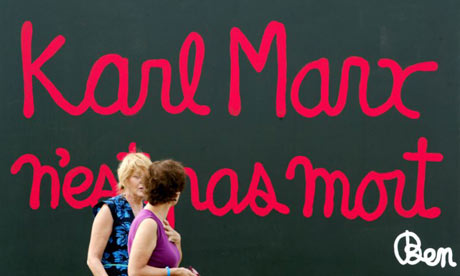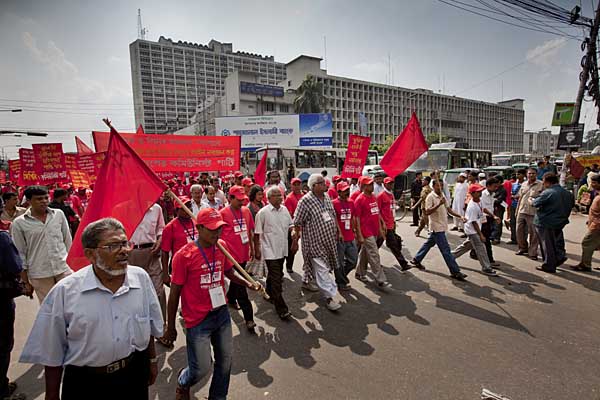Marx-Engels Gesamtausgabe (MEGA2): Has another Marx been revealed?

France, 2010: 'Karl Marx is not dead.'
Why does health care in Cuba cost 96% less than in the US?

Claudia Lopez, an intern, with outpatients at 5 de Septiembre Polyclinic, Havana. Photo by Gail Reed/World Health Organisation.
Irish crisis: A complete failure for neoliberalism

By Eric Toussaint, translated by Christine Pagnoulle in collaboration with Judith Harris
January 3, 2011 -- CADTM -- For a decade, Ireland was heralded by the most ardent partisans of neoliberal capitalism as a model to be imitated. The "Celtic Tiger" had a higher growth rate than the European average. Tax rates on companies had been reduced to 12.5% |1| and the rate actually paid by the transnational corporations that had set up business there was between 3 and 4% -- a CEO’s dream!
Martin Hart-Landsberg: What’s happening on the Korean Peninsula?
By Martin Hart-Landsberg
December 31, 2010 -- Reports from the Economic Front -- What’s happening on the Korean peninsula? If you read the press or listen to the talking heads, your best guess would be that an insane North Korean regime is willing to risk war to manage its own internal political tensions. This conclusion would be hard to avoid because the media rarely provide any historical context or alternative explanations for North Korean actions.
For example, much has been said about the March 2010 (alleged) North Korean torpedo attack on the Cheonan (a South Korean naval vessel) near Baengnyeong Island, and the November 2010 North Korean artillery attack on Yeonpyeong Island (which houses a South Korean military base).
The conventional wisdom is that both attacks were motivated by North Korean elite efforts to smooth the leadership transition underway in their country. The take away: North Korea is an out-of-control country, definitely not to be trusted or engaged in negotiations.
But is that an adequate explanation for these events? Before examining the facts surrounding them, let’s introduce a bit of history. Take a look at the map below, which includes both Baengnyeong and Yeonpyeong Islands.
China, Mao and the global neoliberal offensive
Review by Chris Slee
The Rise of China and the Demise of the Capitalist World Economy
By Minqi Li
Monthly Review Press, New York, 2008
January 4, 2011 – Links International Journal of Socialist Renewal -- Minqi Li’s The Rise of China and the Demise of the Capitalist World Economy deals with a range of topics including the history of the Chinese Revolution, China's role in the world economy today and the future of the world economy. This review will not deal with every aspect of the book, but will focus on Minqi Li's discussion of China's history, economics and politics, and its current role in the world.
What if the state of the world were measured by its majority?

What real democracy looks like: a communal council in Merida votes for its electoral commission in July 2010. Photo by Tamara Pearson.
Wikileaks: Sweden, Assange and the USA

Wikileaks founder Julian Assange was released on bail in Britain on December 16, 2010. It is almost a certainty that the editor of Wikileaks will be turned over to the United States if he is extradited to Sweden.
By Al Burke
December 28, 2010 -- Links International Journal of Socialist Renewal/Nordic News Network -- Sweden has requested the extradition of Wikileaks editor Julian Assange from the United Kingdom, and legal proceedings are expected to commence at the start of the new year. Due to the extraordinary behaviour of the prosecutor in charge of the case, questions have been raised about the prospects of Assange receiving impartial justice in Sweden.[1]
Fred Magdoff: Creating an ecological civilisation

By Fred Magdoff
``It is inconceivable that capitalism itself will lead directly to an ecological civilization that provides the basic needs for all people. However, building an ecological civilization that is socially just will not automatically happen in post-capitalist societies. It will occur only through the concerted action and constant vigilance of an engaged population.''
January 2011 -- Monthly Review -- Given the overwhelming harm being done to the world’s environment and to its people, it is essential today to consider how we might organize a truly ecological civilization—one that exists in harmony with natural systems—instead of trying to overwhelm and dominate nature. This is not just an ethical issue; it is essential for our survival as a species and the survival of many other species that we reverse the degradation of the earth’s life support systems that once provided dependable climate, clean air, clean water (fresh and ocean), bountiful oceans, and healthy and productive soils.
`Development', capitalism, NGOs and people's movements in Bangladesh: an interview with Anu Muhammad

China: Workers' strikes -- what did they win?
By Boy Lüthje
Συνέντευξη με τον Michael Lebowitz και την Marta Harnecker: "Να ξαναεφεύρουμε τον σοσιαλισμό"
[English: http://links.org.au/node/2072]
alterthess :: όλες οι ειδήσεις από την άλλη Θεσσαλονίκη (http://alterthess.gr) --